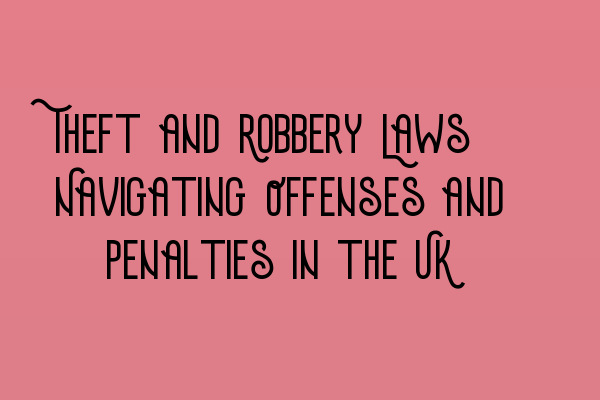Theft and Robbery Laws: Navigating Offenses and Penalties in the UK
Welcome to SQE Criminal Law & Practice Law UK, your trusted source for comprehensive legal guidance. In today’s blog post, we will be exploring the intricacies of theft and robbery laws in the UK, helping you understand the offenses and the corresponding penalties. Whether you are a law student preparing for the SQE 1 or SQE 2 exams, or simply interested in criminal law, this article will provide you with a solid foundation of knowledge. So, let’s dive in!
What is Theft?
Theft, as defined by the Theft Act 1968, is the act of dishonestly appropriating property belonging to another with the intention to permanently deprive them of it. It is a serious criminal offense and one that is punishable under the law. To fully grasp the concept of theft and its variations, it is important to understand the different elements involved.
Elements of Theft
There are three key elements that must be proved to establish a case of theft:
- Appropriation: This refers to the assumption of the rights of the owner, whether by taking, obtaining, or using the property in question. It is essential to note that even if the owner consents to the act, it can still be considered theft if the consent was obtained through deception or coercion.
- Property: The property can encompass a wide range of items, including tangible assets such as money or goods, as well as intangible assets like intellectual property or confidential information.
- Dishonesty: Dishonesty is a subjective concept, but generally involves acting in a way that an ordinary person would consider dishonest. It is important to prove that the accused individual was aware of their dishonest conduct.
Once these elements are established, the accused can be charged with theft and face legal consequences as determined by the court. The severity of the penalties largely depends on the value and nature of the stolen property, as well as any aggravating factors present.
Understanding Robbery
Robbery, on the other hand, is a specific type of theft that involves the use or threat of force to steal property from another person. It is considered a more serious offense due to the element of violence or intimidation involved. The Criminal Justice Act 2003 outlines the legal definition of robbery and the corresponding penalties.
For an act to be classified as robbery, the prosecution must prove that:
- There was a theft involved, i.e., the appropriation of property belonging to another.
- The theft was accompanied by the use or threat of force against the victim.
- The accused had the intention to steal and use force or threats to carry out the act.
Robbery is a serious criminal offense and convictions can result in severe penalties, including imprisonment. The court takes into consideration various factors, such as the level of violence used, the vulnerability of the victim, and any prior criminal history of the offender, when determining the appropriate punishment.
Penalties for Theft and Robbery
The penalties for theft and robbery offenses in the UK vary depending on the circumstances and severity of the crime. In general, theft carries a maximum penalty of seven years’ imprisonment, whereas robbery can result in a life sentence.
It is important to note that the court considers various factors when determining the length of the sentence, including the value of the stolen property, any prior convictions, and the level of violence or intimidation used. Furthermore, rehabilitation programs and leniency may be considered for offenders who show remorse or can demonstrate efforts to make amends.
Seek Legal Guidance for Theft and Robbery Cases
When facing charges related to theft or robbery, it is crucial to seek professional legal guidance to navigate through the complexities of the legal system. At SQE Criminal Law & Practice Law UK, our expert solicitors are well-versed in criminal law matters and can provide you with the support and representation you need.
If you are preparing for the SQE 1 or SQE 2 exams and want to deepen your understanding of criminal law, we recommend checking out our related articles:
- SQE 1 Practice Exam Questions
- SQE 1 Practice Mocks FLK1 FLK2
- SQE 2 Preparation Courses
- SQE 1 Preparation Courses
- SRA SQE Exam Dates
These articles will provide you with valuable resources and information to enhance your legal knowledge and improve your exam preparation.
Thank you for choosing SQE Criminal Law & Practice Law UK as your go-to legal resource. Stay tuned for more insightful articles on various aspects of criminal law.
Disclaimer: The information provided in this article is for general informational purposes only and does not constitute legal advice. For specific legal advice, please consult with a qualified solicitor.
